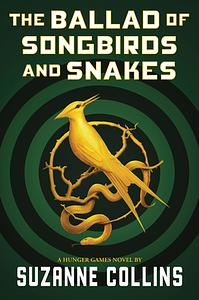Take a photo of a barcode or cover
This was interesting. I honestly thought this book would make me excuse Snow's actions. But, to the contrary, it only made me despise him more.
This book showed a hate-filled charismatic sociopath. He managed to exceed my expectations with the vileness of his actions.
I could not bring myself to like him, but I enjoyed his character. The symbolizim in this book goes a long way. And Suzanne managed to wrap up the plot in a way that fit perfectly with the rest of the trilogy.
Lucy Gray and the Covey deserved better. Tigris deserved way better.
And somehow, snow lands on top.
This book showed a hate-filled charismatic sociopath. He managed to exceed my expectations with the vileness of his actions.
I could not bring myself to like him, but I enjoyed his character. The symbolizim in this book goes a long way. And Suzanne managed to wrap up the plot in a way that fit perfectly with the rest of the trilogy.
Lucy Gray and the Covey deserved better. Tigris deserved way better.
And somehow, snow lands on top.
adventurous
dark
emotional
informative
mysterious
tense
medium-paced
Plot or Character Driven:
A mix
Strong character development:
Complicated
Loveable characters:
Complicated
Diverse cast of characters:
Yes
Flaws of characters a main focus:
Complicated
adventurous
dark
medium-paced
Plot or Character Driven:
A mix
Strong character development:
Complicated
Loveable characters:
Complicated
Diverse cast of characters:
N/A
Flaws of characters a main focus:
Complicated
challenging
dark
emotional
medium-paced
Plot or Character Driven:
A mix
Strong character development:
Yes
adventurous
dark
mysterious
tense
slow-paced
Plot or Character Driven:
Plot
Strong character development:
Yes
Loveable characters:
Yes
Diverse cast of characters:
Yes
Flaws of characters a main focus:
Yes
emotional
sad
tense
medium-paced
Plot or Character Driven:
A mix
Strong character development:
Yes
Loveable characters:
Complicated
Flaws of characters a main focus:
Yes
I'm always surprised by how thoughtful these books are. Like there's parts of the world building that don't make sense (I will never get over the size of the districts) but they are deeply engaging and honest about the ways that we justify cruelty and oppression as a species. Honestly this book does an excellent job of depicting a teenager teetering on the edge of radicalization.
adventurous
challenging
dark
mysterious
reflective
tense
medium-paced
I reread The Hunger Games a couple years ago and was pleasantly surprised by how well they held up. Sure, they're not as revolutionary as the zeitgeist had us believing in the 2010s, but the parallels and the commentary are there. Thus I had high hopes for this book, when so much had happened in the decade since Mockingjay. Ultimately, what I got was a book that did not justify the ten years it took to be released.
I was immediately pulled into the universe, more due to my nostalgia for the series than for any engaging writing. However, I grew quickly bored of the narrative; some of the writing sounds like first draft phrasing and details that could (should) have been cleaned up in the editing process. There was cheesiness that I didn't expect or appreciate.
It was interesting to see the origin of the games, the way its founders talked about it, the slight revelation at the end about the games' creator. Coriolanus's role in the formation seems a bit overblown -- were ALL his classmates really that useless? -- and the drama is a bit gratuitous to me.
Also gratuitous is the constant restating of facts that were just mentioned a chapter ago. I get this book is aimed at a younger audience and there are a lot of weird sounding names and details to remember, but it's a bit insulting for a character to be reintroduced every time they reenter the story. It's not so complex that we need the reminder.
Speaking of complexity, if Collins was trying to write Coriolanus as complex, she did not succeed. If she was trying to write him as wholly self-serving, shallow, entitled, uncaring, impulsive, and unlikeable, mission accomplished. Obviously we all know how he ends up in the original trilogy, but usually a villain backstory makes some attempt at endearing them to the audience, or humanizing them in some way, but throughout the narrative Coriolanus chooses his own preservation over everything: his supposed friendships, his tepid romance with his tribute (am I really supposed to believe he was in love with her? That had to be a farce, right?), even his family whom he claims to care about. He's ready to abandon it all on a whim, then sacrifice his previous choice in a heartbeat. He's immature and selfish, and we do not see him evolve into the cunning, refined Snow whom we know from his presidency.
If we're not supposed to take Coriolanus as a sympathetic character, then that leaves an even worse message, in my eyes. That it wasn't circumstances that led Coriolanus to his evilness, it wasn't lost love or the war or any other external factor: he was simply born that way, either by way of being a Capitol citizen or because he was a Snow. Sure, you could say that the system raised him that way from birth, but his classmates weren't the same level of narcissistic or committed to their vision of themselves as superior, morally or otherwise. His own cousin, Tigris, did not seem to be that way, although we don't get to know her very well because Coriolanus cares about no one except himself.
Dr. Gaul's ideas, to which Coriolanus is so opposed, about the infallibility of human nature, do not apply only to violence. According to the narrative, one can be born inherently selfish, egotistical, authoritarian, unkind, unfeeling, etc. Thus Coriolanus was always going to be evil, and his decisions only followed his nature, and it couldn't have ever been otherwise. What does that say about our current reality, the "villains" of this system? Have they no responsibility for their actions because they were always going to be wealthy and entitled, always going to exploit the working class for their power? Our choice as readers is either to believe that, or to believe in Coriolanus's crocodile tears for Sejanus and his superficial feelings for Lucy Gray. Either way, I'm disappointed.
I was immediately pulled into the universe, more due to my nostalgia for the series than for any engaging writing. However, I grew quickly bored of the narrative; some of the writing sounds like first draft phrasing and details that could (should) have been cleaned up in the editing process. There was cheesiness that I didn't expect or appreciate.
It was interesting to see the origin of the games, the way its founders talked about it, the slight revelation at the end about the games' creator. Coriolanus's role in the formation seems a bit overblown -- were ALL his classmates really that useless? -- and the drama is a bit gratuitous to me.
Also gratuitous is the constant restating of facts that were just mentioned a chapter ago. I get this book is aimed at a younger audience and there are a lot of weird sounding names and details to remember, but it's a bit insulting for a character to be reintroduced every time they reenter the story. It's not so complex that we need the reminder.
Speaking of complexity, if Collins was trying to write Coriolanus as complex, she did not succeed. If she was trying to write him as wholly self-serving, shallow, entitled, uncaring, impulsive, and unlikeable, mission accomplished. Obviously we all know how he ends up in the original trilogy, but usually a villain backstory makes some attempt at endearing them to the audience, or humanizing them in some way, but throughout the narrative Coriolanus chooses his own preservation over everything: his supposed friendships, his tepid romance with his tribute (am I really supposed to believe he was in love with her? That had to be a farce, right?), even his family whom he claims to care about. He's ready to abandon it all on a whim, then sacrifice his previous choice in a heartbeat. He's immature and selfish, and we do not see him evolve into the cunning, refined Snow whom we know from his presidency.
If we're not supposed to take Coriolanus as a sympathetic character, then that leaves an even worse message, in my eyes. That it wasn't circumstances that led Coriolanus to his evilness, it wasn't lost love or the war or any other external factor: he was simply born that way, either by way of being a Capitol citizen or because he was a Snow. Sure, you could say that the system raised him that way from birth, but his classmates weren't the same level of narcissistic or committed to their vision of themselves as superior, morally or otherwise. His own cousin, Tigris, did not seem to be that way, although we don't get to know her very well because Coriolanus cares about no one except himself.
Dr. Gaul's ideas, to which Coriolanus is so opposed, about the infallibility of human nature, do not apply only to violence. According to the narrative, one can be born inherently selfish, egotistical, authoritarian, unkind, unfeeling, etc. Thus Coriolanus was always going to be evil, and his decisions only followed his nature, and it couldn't have ever been otherwise. What does that say about our current reality, the "villains" of this system? Have they no responsibility for their actions because they were always going to be wealthy and entitled, always going to exploit the working class for their power? Our choice as readers is either to believe that, or to believe in Coriolanus's crocodile tears for Sejanus and his superficial feelings for Lucy Gray. Either way, I'm disappointed.
adventurous
dark
tense
medium-paced
Plot or Character Driven:
A mix
Strong character development:
No
Loveable characters:
Complicated
Diverse cast of characters:
Yes
Flaws of characters a main focus:
Yes




